
Store managers know the daily chaos: employees calling out last-minute while promotional displays sit unfinished, district managers texting about compliance checks while customers wait for help, and shift supervisors juggling inventory counts with customer complaints. Modern retail pulls teams in every direction at once.
The retail task management software market was valued at USD 1,320 million in 2024 and is projected to reach USD 5,907 million by 2032 — because retailers are done with the constant scramble. When your team is spread across multiple shifts and locations, keeping everyone aligned on priorities becomes nearly impossible without the right systems.
Retail task management software eliminates this operational chaos by giving you one central place to assign tasks, track progress, and communicate with your team. Instead of playing phone tag and hoping important tasks get done, you get total visibility into what's happening across your stores — accessible from any phone while your team helps customers.
TL;DR: Best retail task management software in 2026
The best task management software for retail ensures critical tasks get completed consistently across all shifts and locations. When used correctly, the right platform saves management time, reduces operational mistakes, and improves team accountability.
Top recommendations based on retail needs:
- Best for hourly teams: Homebase. Free starter plan with scheduling, time tracking, and team communication; add-on for task management available.
- Best for large retailers: YOOBIC. Mobile-first platform designed for visual merchandising and corporate communication.
- Best for field operations: Zipline. Connects headquarters with store teams for seamless execution.
- Best for on-demand needs: TaskRabbit. Access to background-checked contractors for specific retail tasks.
- Best for flexibility: Asana. Customizable project management that adapts to retail workflows.
- Best enterprise solution: Zebra Workforce Management System. Advanced workforce optimization with compliance tracking.
- Best scheduling integration: When I Work. Simple task management tied to employee schedules.
Must-have features in any system:
- Mobile access for floor staff who work on their feet
- Photo verification to prove task completion
- Shift-based task assignments that sync with schedules
- Real-time completion tracking and notifications
- Integration with existing scheduling and payroll tools
What is retail task management software?
Retail task management software is your digital command center for everything that needs to happen in your stores. Whether you're rolling out promotional displays, conducting safety checks, or ensuring opening and closing procedures get completed correctly, this software keeps everyone marching to the same beat.
Unlike generic project management tools built for office environments, retail task management software tackles the unique challenges of floor-based work, multiple shifts, and customer-facing operations. It's built for teams who work on their feet, not at desks. Common retail tasks that get supercharged through these platforms include daily opening and closing checklists, visual merchandising resets, inventory management, compliance and safety monitoring, promotional rollouts, and training delivery.
Benefits of task management software for retail teams
Smart task management software transforms retail operations from constant firefighting into smooth, predictable workflows. Here's what retail teams see when they make the switch.
Consistent task execution across all locations.
Without task management software, rolling out new procedures or changes becomes a massive undertaking that takes weeks and results in inconsistent implementation. Retail management software changes the game completely — when you create a task template for "Holiday Display Setup," every store gets identical step-by-step instructions, photo examples, and completion requirements. Push updates instantly to all locations instead of spending weeks on manual rollouts, ensuring customers get the same experience at every location.
Increased visibility and accountability.
The Logile 2025 Labor Planning and Optimization Report points out that 77% of retail associates say their store regularly loses sales due to poor scheduling or staffing decisions, which is often because tasks fall through the cracks when managers can't see what's getting done.
The best task management software for retail gives you X-ray vision into task completion across your entire operation — see which tasks are overdue, which team members consistently crush their assignments, and where bottlenecks occur. This visibility helps you make smarter staffing decisions and catch problems before they kill sales.
Real-time communication between managers and staff.
Group texts disappear and paper notes get lost in busy retail environments, causing important updates about pricing changes or safety procedures to vanish in the daily shuffle. Retail task management platforms centralize all communication where your team already works, sending notifications through the app they use for daily tasks. Read receipts show who's seen updates, and you can send location-specific messages without flooding everyone with irrelevant information.
Mobile-friendly access for on-the-floor employees.
Your team spends their day helping customers on the sales floor, not sitting at back-office computers. Mobile-optimized task management lets team members check assignments, mark completions, and upload verification photos without abandoning customers. They can quickly reference procedures while helping customers and update task status between interactions, keeping work flowing smoothly without pulling staff away from customer service.
Easier rollout of SOPs, promotions, and training.
New retail employees need to get up to speed fast, but traditional training relies on shadowing experienced staff who may not have time for thorough explanations. Task management systems work like digital training guides with step-by-step instructions, visual aids, and examples. New employees learn consistent procedures from day one instead of picking up random habits from different trainers, slashing the learning curve and helping them contribute faster.
Top features to look for in retail task management software
Not all task management software works for retail operations. When evaluating options, focus on the following features that address the unique challenges of managing dispersed teams, customer-facing work, and operational compliance.
Customizable task lists and recurring checklists.
Your opening procedures, closing checklists, and weekly maintenance tasks happen repeatedly with the same steps every time. Look for software that lets you create templates for these recurring workflows instead of having to waste time manually recreating tasks again and again. Plus, consider smart systems that let you customize task lists by location, season, or team role.
Task assignments and completion tracking.
Retail work happens across multiple shifts with different staffing levels, so your task management software needs to understand these patterns and help you assign work accordingly. Look for features that let you assign tasks to specific shifts, roles, or individuals, plus handle task dependencies — inventory counts must happen before reorders, and promotional displays can't be set up until merchandise arrives.
Photo uploads for task proof.
"Task completed" doesn't mean much without proof. Visual verification through photo uploads ensures tasks are done correctly and provides documentation for compliance purposes. The best systems let you require photo verification for specific tasks while keeping it optional for others — you might need photos of promotional displays and safety equipment but not for routine cleaning tasks.
Smart scheduling and prioritization.
Retail operations move at lightning speed, and you need to know immediately when critical tasks are falling behind schedule. Real-time tracking shows you task status across all locations without requiring manual check-ins. Smart notification systems alert you to overdue tasks, approaching deadlines, and completed assignments, with customizable alerts based on task priority and your management style.
Internal communication and announcements.
Task management often requires explanation, clarification, or updates that don't fit into simple task descriptions. Integrated communication features let team members ask questions, share updates, and receive important announcements without juggling multiple apps. Look for systems that support both task-specific comments and general team communication through the same platform they use for daily work.
Reporting on task completion, productivity, and compliance.
Understanding task completion patterns helps you improve operations over time. Reporting features should show you which tasks consistently take longer than expected, which team members need additional training, and where procedural changes might improve efficiency. The most useful reports focus on actionable insights rather than data dumps — completion rates by location, average task duration, and trends over time help you make better decisions about staffing, training, and process improvements.
Best retail task management software for 2026
Below are seven solutions that we believe deliver real value for different types of retail operations. Each excels in specific areas, so your ideal choice depends on your team size, number of locations, and operational priorities.
1. Homebase: Best for hourly teams and task tracking tied to schedules
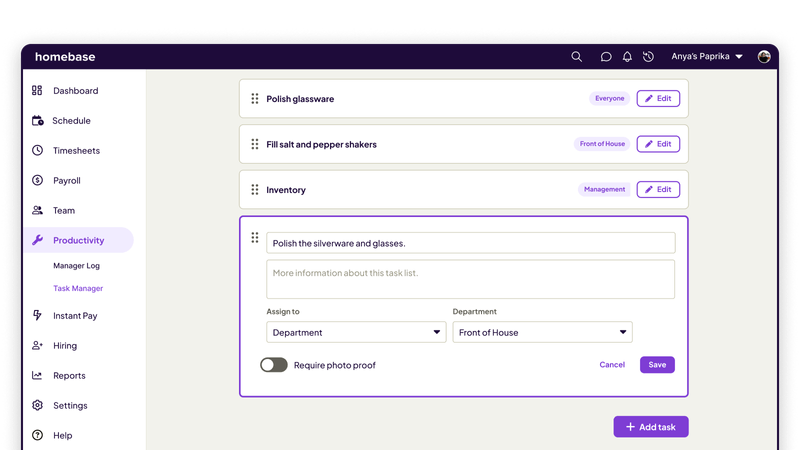
Homebase combines scheduling, task management, time tracking, and team communication in one platform built specifically for hourly retail teams. It understands and addresses the unique challenges of shift-based work, multiple locations, and high-turnover workforces.
Best for: Small to medium retail businesses with 5-200 employees who need task management that integrates seamlessly with scheduling and payroll. Perfect for operations that want to eliminate juggling multiple apps and systems.
Key features:
- Free scheduling and time tracking: Create schedules, track time, and manage availability without paying anything
- Shift trading and coverage: Let employees swap shifts and claim open shifts through the mobile app
- Built-in payroll processing: Calculate wages, handle tax withholdings, and process direct deposits automatically
- Team messaging with read receipts: Send announcements and updates with confirmation that staff have seen them
- Hiring and onboarding tools: Post jobs, screen candidates, and complete new hire paperwork digitally
Mobile app: Yes; full-featured iOS and Android apps that work offline
Starting price: Free for basic scheduling and time tracking; paid plans start at $24/month per location. Task manager is available as an add-on at $13/month per location.
2. YOOBIC: Best for large retailers and visual merchandising
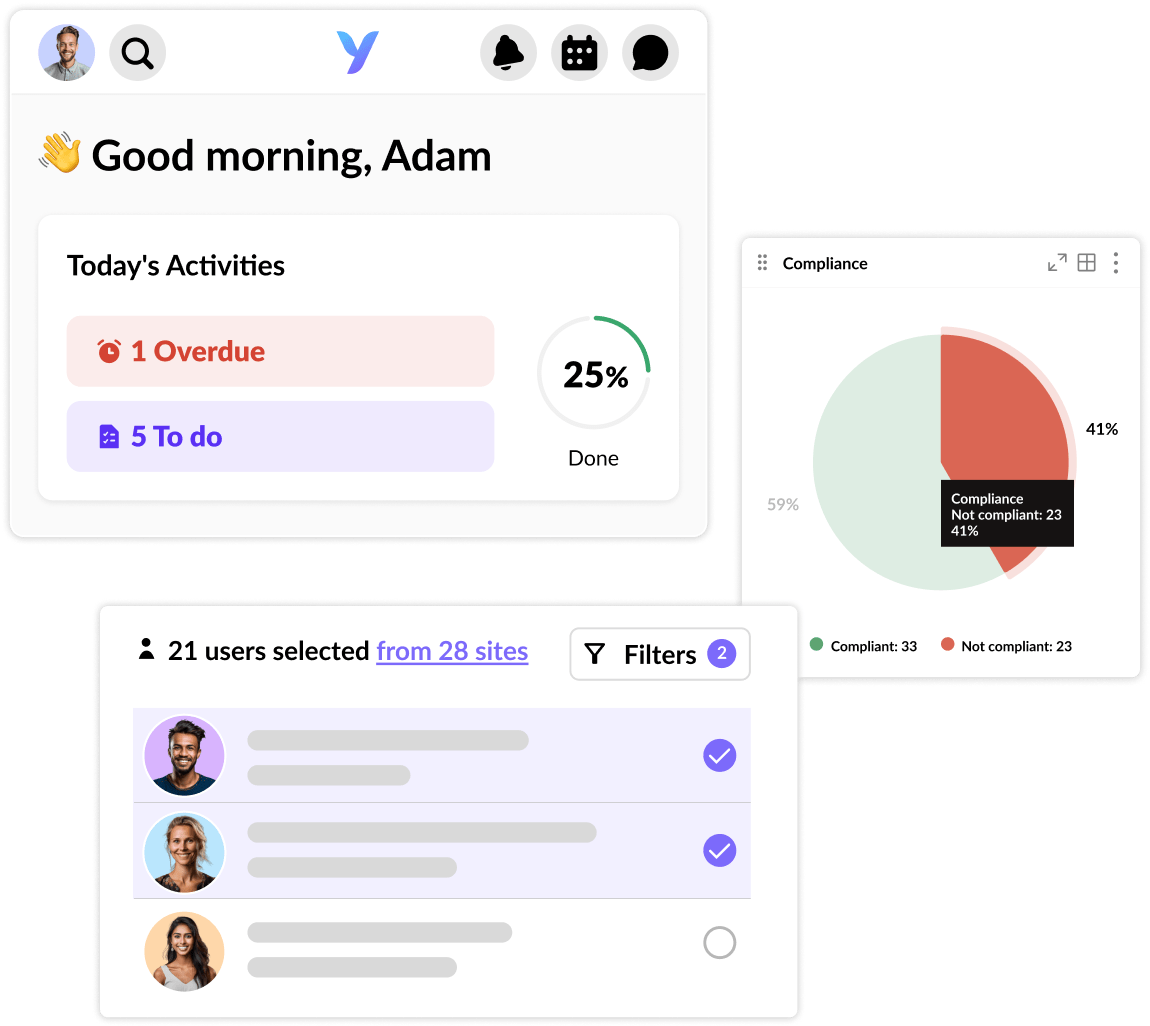
YOOBIC specializes in mobile-first communication and task execution for large retail chains. The platform excels at visual merchandising, training delivery, and ensuring consistent brand execution across hundreds of locations.
Best for: Large retailers with 100+ locations or 1,000+ employees who need sophisticated visual merchandising coordination and corporate communication tools.
Key features:
- Mobile-first internal communications: Deliver corporate messages and updates through an engaging social media-style interface
- Task management with multimedia: Create tasks with photo examples, video instructions, and step-by-step visual guides
- Custom training content delivery: Build and distribute training modules with interactive elements and progress tracking
- Newsfeed for announcements: Share company news, recognition, and updates through a centralized feed
- Advanced insights and reporting: Track task completion, engagement rates, and performance metrics across all locations
Mobile app: Yes; designed mobile-first with robust offline capabilities
Starting price: Contact sales for custom pricing
3. Zipline: Best for field communication and execution
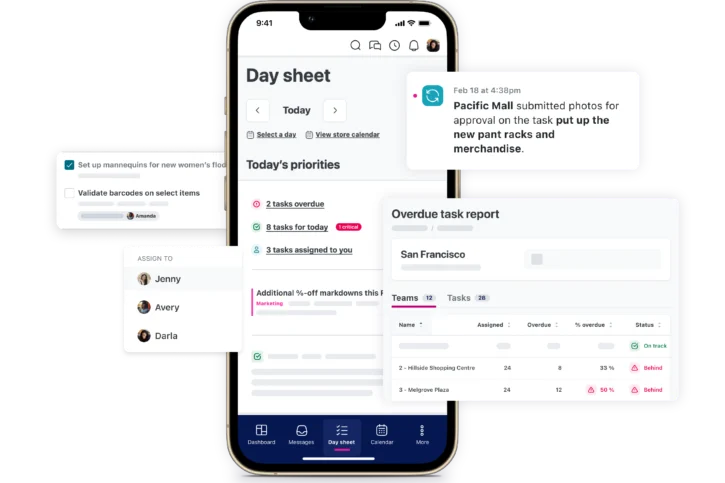
Zipline connects headquarters, district managers, and store teams through a unified platform designed for retail field operations. The system excels at cascading information and ensuring consistent execution across multi-location retail operations.
Best for: Mid-size to large retail chains that struggle with communication between corporate headquarters and field locations, especially those with complex operational procedures.
Key features:
- Frontline operations platform: Purpose-built for retail field operations and store-level execution
- HQ-to-store communication: Streamline communication between corporate teams and individual store locations
- Inventory and order management: Integrate task management with inventory processes and ordering workflows
- Real-time communication tools: Enable instant messaging and updates between different organizational levels
- Performance insights and analytics: Track execution rates and identify operational bottlenecks across locations
Mobile app: Yes; full mobile functionality for field-based teams
Starting price: Contact sales for custom pricing
4. TaskRabbit: Best for small teams and on-demand needs
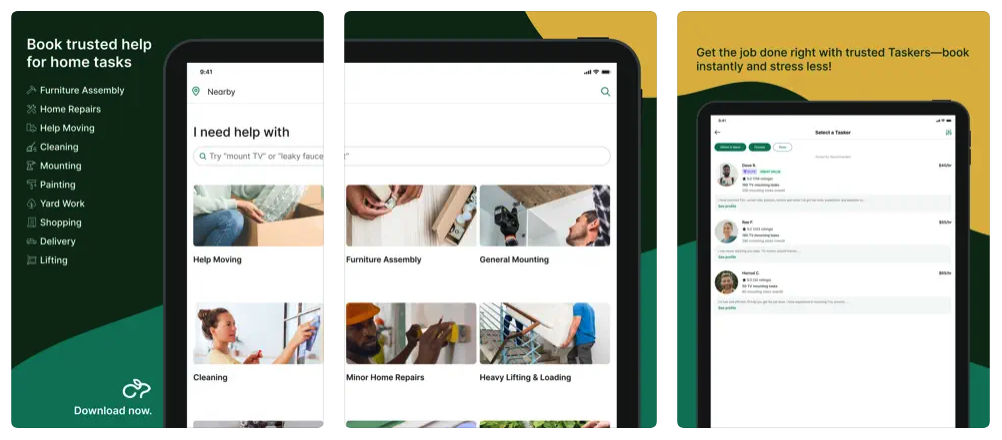
TaskRabbit adapts the popular on-demand service platform for small retail teams who need flexible task completion and occasional outside help with specific projects.
Best for: Small retail businesses that need occasional help with setup tasks, seasonal projects, or specialized work that doesn't require full-time staff such as cleaning or delivery.
Key features:
- On-demand task fulfillment: Access background-checked contractors for specific retail tasks and projects
- Background-checked taskers: Work with pre-screened professionals who understand retail environments
- Scheduling flexibility: Book help when you need it without long-term commitments
- In-app communication: Coordinate with taskers through integrated messaging and updates
- Payment and review system: Handle payments automatically and build relationships with reliable contractors
Mobile app: Yes; full mobile functionality for task management and communication
Starting price: Varies depending on the task and location
5. Asana: Best generic tool adapted for small retail teams
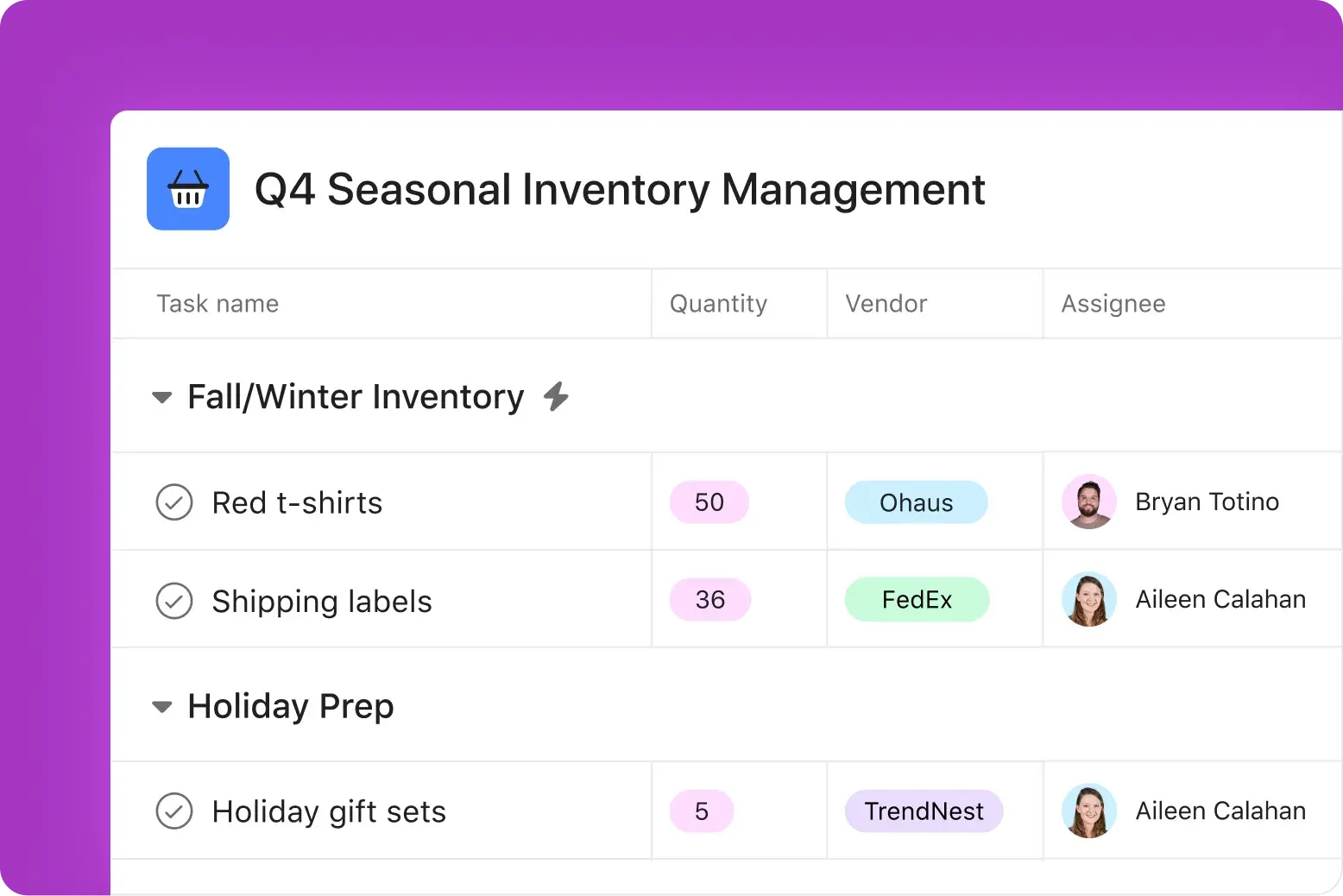
Asana is a flexible project management platform that small retail teams can adapt for task management, project coordination, and team collaboration. While not built specifically for retail, its versatility makes it useful for smaller operations.
Best for: Small retail teams (under 50 people) who need flexible task management and project coordination tools that can adapt to various retail workflows.
Key features:
- Task assignment with deadlines: Create and assign tasks with due dates, priorities, and custom fields
- Project timelines and calendars: Visualize task schedules and project deadlines across different views
- Collaboration tools: Share files, add comments, and coordinate work through integrated communication features
- File attachments and documentation: Store task-related documents and reference materials in one place
- Progress tracking and reporting: Monitor task completion rates and team productivity over time
Mobile app: Yes; full mobile functionality with offline capabilities
Starting price: Free for basic features; premium plans start at $10.99/user/month
6. Zebra Workforce Task Management: Best enterprise-grade retail operations
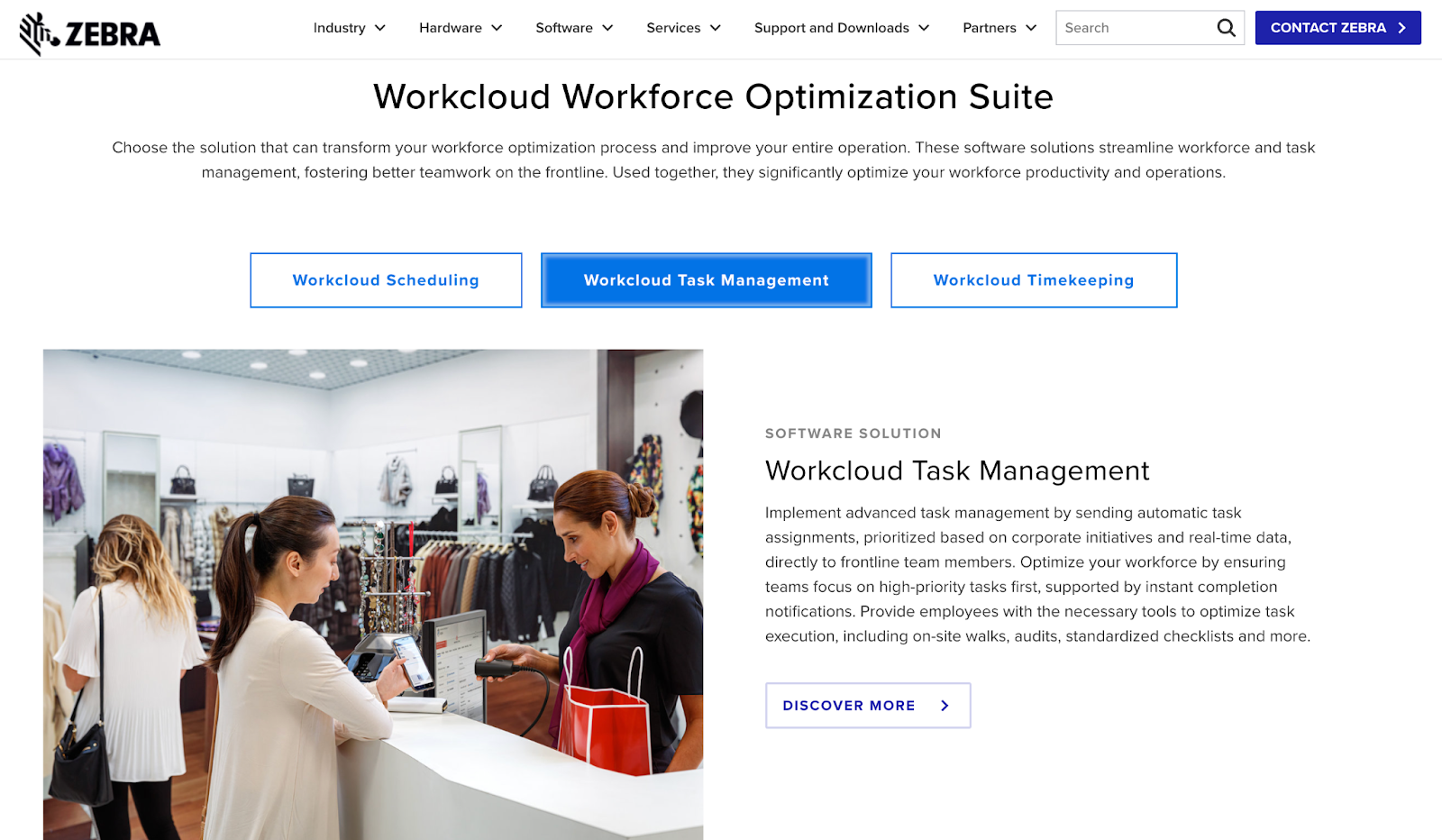
Zebra Technologies’ Workforce Task Management Software offers comprehensive workforce management and task coordination for large retail enterprises. The platform integrates scheduling, task management, and labor optimization for complex retail operations.
Best for: Large retail enterprises with sophisticated scheduling needs, complex compliance requirements, and advanced analytics requirements.
Key features:
- Automated scheduling optimization: Use AI-driven scheduling that balances labor costs with customer traffic patterns
- Labor forecasting and budgeting: Predict staffing needs and control labor costs through advanced analytics
- Real-time data and analytics: Access comprehensive reporting on task completion, labor efficiency, and operational metrics
- Compliance management tools: Track labor law compliance, break requirements, and regulatory adherence automatically
- Mobile workforce management: Provide full mobile functionality for managers and employees across all locations
Mobile app: Yes; comprehensive mobile apps for iOS and Android
Starting price: Contact sales for specifics
7. When I Work: Best for integrating scheduling + task management
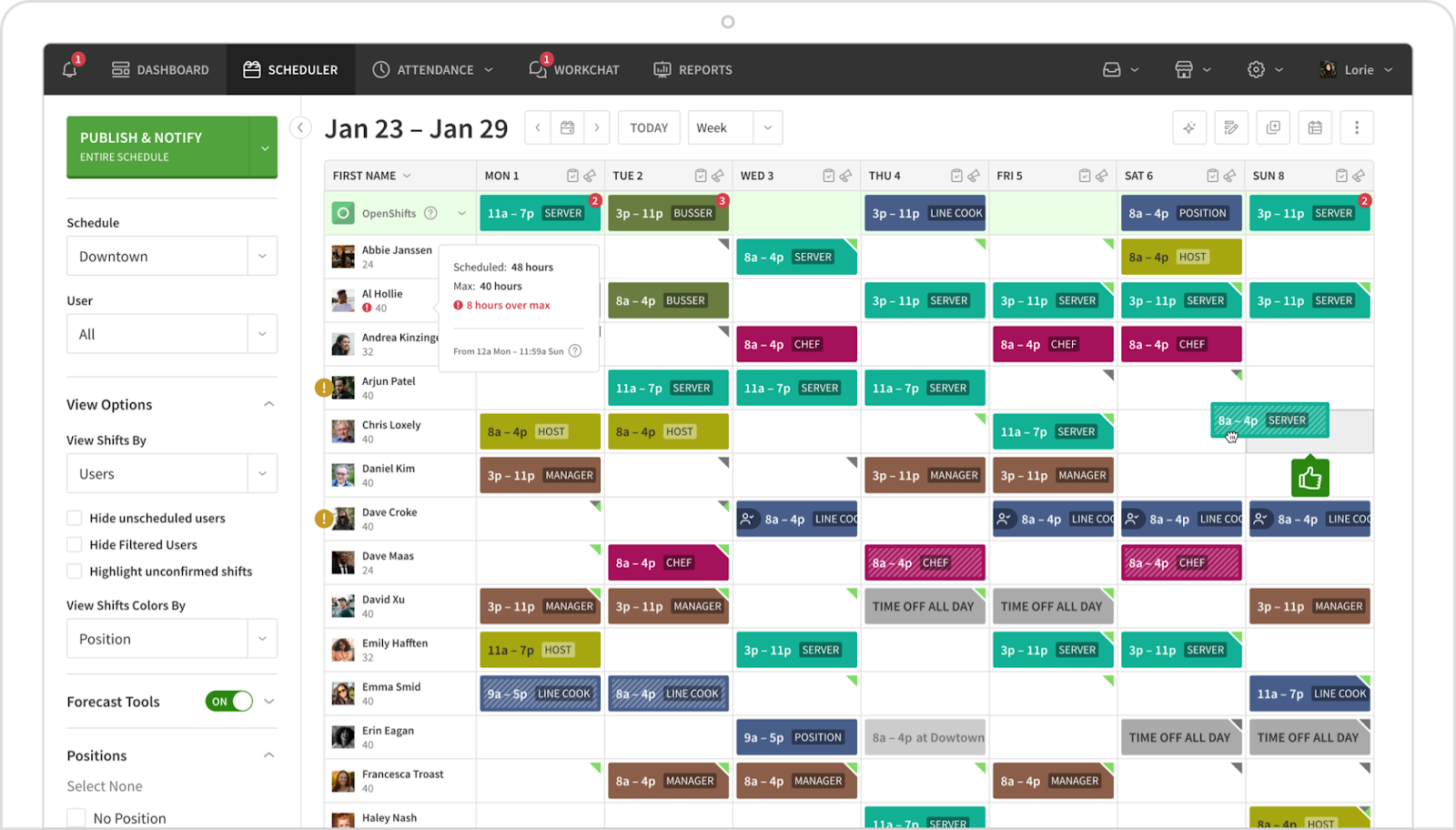
When I Work combines employee scheduling with basic task management features, making it ideal for retailers who want simple integration between these two essential functions.
Best for: Small to medium retail businesses that need straightforward scheduling and task management integration without complex features or high costs.
Key features:
- Employee scheduling with drag-and-drop: Create schedules quickly and handle shift changes through an intuitive interface
- Time tracking and attendance: Monitor employee hours and attendance with mobile clock-in/out functionality
- Team messaging and communication: Send messages and updates to individuals, groups, or entire teams
- Shift swapping and coverage: Allow employees to trade shifts and claim open shifts through the mobile app
- Attendance tracking and reporting: Monitor punctuality and generate reports on attendance patterns
Mobile app: Yes; user-friendly mobile apps with strong scheduling functionality
Starting price: $2.5/user/month for single locations or schedules; $5/user/month for multiple locations or schedules
How to choose the best retail task management software
Choosing task management software for retail isn't about finding the platform with the most features — it's about finding the one that actually works for your specific retail operation. Here's how to cut through the marketing noise and pick software that delivers real results.
Match software to your store size and number of locations.
Single-location retailers need simple solutions that integrate retail scheduling with basic task management, while multi-location retailers need software that handles location-specific assignments, corporate communication, and consolidated reporting across all stores. Consider your growth plans too — if you're opening additional locations within two years, choose software that scales without requiring expensive migrations later.
Prioritize ease of use for floor staff.
Your team works on their feet, not at desks, and they don't have time to learn complicated software while customers are waiting. The best retail task management software feels intuitive from day one — team members should check assignments, mark tasks complete, and upload photos without hunting through confusing menus. Choose platforms that prioritize mobile usability and simple workflows over flashy features that look impressive in demos but frustrate real users.
Check integrations with your time clock or scheduling tools.
Retail task management software that doesn't connect with your existing systems creates more work, not less. The best integrations automatically assign tasks to whoever's scheduled to work specific shifts, eliminating manual coordination between different apps and preventing double data entry that wastes management time.
Evaluate mobile functionality and offline access.
Retail locations don't always have perfect internet connections, especially in stockrooms, basements, or older buildings. Look for apps that sync tasks and allow offline completion, so team members can check assignments and mark tasks complete without internet access. The system should automatically sync all changes once connectivity returns, preventing lost work and frustrated employees.
Consider reporting and analytics if managing multiple locations.
Single-location retailers can usually manage with basic task completion tracking, but multi-store operations need deeper insights into performance patterns across locations. Reporting features should show you which stores consistently struggle with specific tasks and where additional training might be needed.
Tips for getting team buy-in before implementation.
Team resistance kills even the best software implementations, so involve key staff members in the selection process from the beginning. Let experienced employees test different platforms during free trials and show them how the software eliminates confusion about task assignments and reduces constant check-ins with managers. When people understand how new tools make their jobs easier, adoption happens naturally.
FAQs about retail task management tools
What is retail task management software used for?
Retail task management software coordinates all the daily, weekly, and seasonal tasks that keep stores running smoothly — opening and closing checklists, promotional displays, inventory counts, safety inspections, and cleaning schedules. The software ensures nothing falls through the cracks when team members change shifts, providing accountability through completion tracking, photo verification, and automatic compliance documentation.
How is retail task software different from project management tools?
Project management tools are designed for office environments with long-term projects over weeks or months, while retail task software handles short-term, recurring work that happens on specific shifts with immediate deadlines. Retail-specific features include photo verification of completed displays, shift-based task assignments, location-specific coordination across multiple stores, and compliance documentation that generic project management tools don't provide.
Can retail task tools integrate with scheduling or payroll?
Most modern retail task management platforms integrate with popular scheduling and payroll systems to eliminate double data entry, automatically assign tasks to scheduled employees, and feed completion data into payroll systems for accurate time tracking. Integration capabilities vary significantly between platforms, so check compatibility with your existing systems before making a decision.
What's the best free retail task management software?
Homebase offers a genuinely useful free tier that includes unlimited scheduling and time tracking for retail teams, which works indefinitely without forcing upgrades. While task management requires a paid add-on at $13/month per location, the free scheduling and time tracking features alone provide significant value for small retail operations. Other platforms like Asana offer free project management tools, but they're designed for general workflows rather than retail-specific needs like shift scheduling and hourly employee time tracking.
Streamline your store ops with the right task tool
Getting everyone on the same page, every shift, every day isn't just about organization—it's about protecting your bottom line. When promotional displays go up on time, inventory stays accurate, and compliance requirements get met automatically, you're not just running a tighter operation — you're creating better customer experiences that drive repeat business.
The chaos of juggling schedules, tasks, and team communication across multiple shifts eats up management time that could be spent growing your business. Homebase eliminates this operational friction by combining task management with the scheduling and team communication tools you already need, all in one platform that actually works for retail operations.
Ready to give your team the clarity they need to crush their daily responsibilities? Try Homebase free and see why over 150,000 small businesses trust us for their operations.
Share post on

Homebase Team
Remember: This is not legal advice. If you have questions about your particular situation, please consult a lawyer, CPA, or other appropriate professional advisor or agency.
Popular Topics
Homebase is the everything app for hourly teams, with employee scheduling, time clocks, payroll, team communication, and HR. 100,000+ small (but mighty) businesses rely on Homebase to make work radically easy and superpower their teams.








